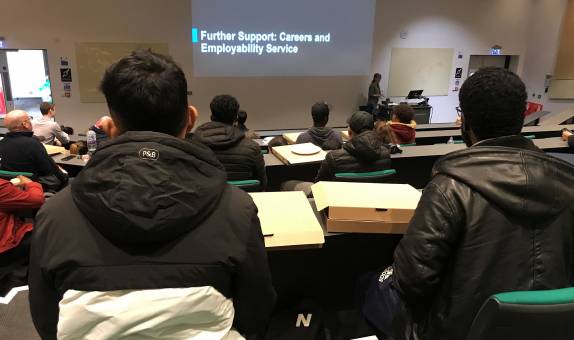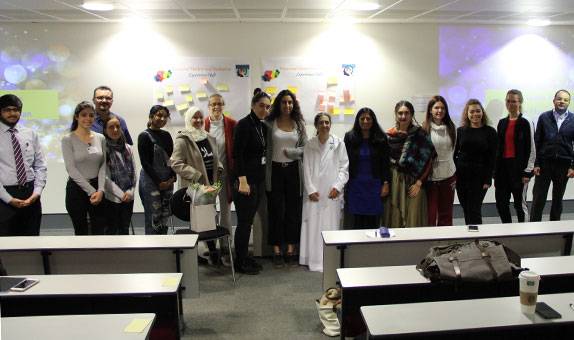Financial Economics BSc (Hons)

Teaching Excellence Framework (TEF) Gold award
Our commitment to high quality teaching has been recognised with a TEF Gold rating. The University has received an overall rating of Gold, as well as securing a Gold award in the framework's two new student experience and student outcomes categories.
Why choose this course?
How is our economy affected by financial markets and institutions? What might their economic impact be from an organisation's decisions on pricing and corporate finance?
This course offers you an understanding of how the economy and the financial system are connected. Through a distinctive, pluralist approach, the course examines both traditional and alternative theories and their real-life applications.
You'll explore the interplay of financial markets, instruments, and institutions, as well as their impact on the economy. You'll develop many skills that are highly valued by employers. These include analytical, numerical, data analysis and problem-solving skills, and the use of specialist statistical software.
| Attendance | UCAS code/apply | Year of entry |
|---|---|---|
| 3 years full time | L111 | 2024 (Clearing) 2025 |
| 4 years full time including foundation year | L11A | 2024 (Clearing) 2025 |
| 4 years full time including sandwich year | LA11 | 2024 (Clearing) 2025 |
| 6 years part time | Apply direct to the University | 2024 (Clearing) 2025 |
Please note: Teaching on this course may take place on more than one KU campus.
| Main Location | Penrhyn Road |
Reasons to choose Kingston University
- We're a diverse, inclusive, and friendly department which introduces you to a variety of ways to study Economics.
- Our flexible structure means you can transfer between our three courses at the end of your first year.
- You will have free access to the Financial Times, Economist, and our state-of-the-art Bloomberg trading room. All first-year students are supported by their own individual student mentor.
- Graduates have gone on to work for a range of organisations, including the Bank of England, the Home Office, Deloitte, Goldman Sachs, and Citigroup.
- We will teach you a wide range of skills, theories and methods to prepare you for employment and empower you to shape the economies of tomorrow, no matter your background.
- 94% of Financial Economics student respondents agreed that staff were good at explaining things (NSS 2024).
What our graduates say
Kingston's Department of Economics
What you will study
This course builds your knowledge of core topics and different schools of thought in economics. The Financial Economics BSc (Hons) explores the interplay of financial markets, instruments and institutions and their impact on the economy.
Year 1
Year 2
Optional year
Sandwich year
Final year
Year 1 provides a historical background to modern economics, whilst exploring a range of economic principles and perspectives. You will also begin to study the mathematical and statistical foundations essential to the study of economics.
Core modules
Becoming an Economist
30 credits
The module will help you develop many of the basic skills used in the discipline of economics. The module explores and covers a variety of study and research techniques. You will develop skills in the use of language, writing, ICT usage, data collection, data interpretation and group work. Key threshold economic concepts will also be incorporated. Particular emphasis will be placed on small-group learning and personal development planning.
Economic Policy and Principles
30 credits
In this module, you are introduced to the techniques of model building and analytical reasoning used in microeconomics. Some of these techniques are then used as an input into the analysis of economics at the macroeconomic level. In the early phase of the module, you are taught about microeconomic models and explore the application of these models, to current economic issues. Whilst, in the later phase, you learn about the main macroeconomic aggregates, the basic model of aggregate demand and supply and the importance of the time horizon in macroeconomics.
Throughout the course, there is an emphasis on highlighting and considering the pros and cons of the suggested solutions to real problems faced by market economies.
Introductory Mathematics and Statistics for Economics
30 credits
This module provides an introduction to mathematical and statistical techniques; you will be prompted to appreciate how mathematical reasoning is used in economics and develop skills in the numerical, graphical and statistical analysis of economic data. The course starts with a review of material that may have been encountered in your previous studies, such as mathematics at GCSE or IB level, and moves on to developing your knowledge, understanding and ability to apply quantitative concepts, of particular relevance for microeconomics, macroeconomics and econometrics.
Capitalism
30 credits
This module is a core course for students pursuing full-field programmes in Economics.
This module offers a detailed survey of the origins and emergence of capitalism and the economic thinking that paralleled these developments. It will develop key aspects of the contemporary economy - firms and competition in the national and international environment and the role of the state in national and supra-national contexts. It will then proceed with an introduction to the role of finance in capitalism and the nature and causes of financial crises.
Year 2 further develops your knowledge of microeconomics (individual or company decisions) and macroeconomics (national decisions). You'll consider mainstream and alternative approaches to economic modelling. And begin to explore economic perspectives within corporate finance and investment.
Core modules
Corporate Finance and Investment
30 credits
This module provides an introduction to modern finance and financial markets. Core elements of corporate finance are examined in the broader context of the working of financial markets and institutions, and the pricing of financial assets. We will discuss key analytical concepts, tools and theories of financial decision making and the functioning of financial markets, and examine empirical information about trends in the global financial system.
Mathematical Economics and Econometrics
30 credits
This module will extend knowledge of mathematical and statistical techniques acquired at level 4 and will introduce you to multivariate techniques in mathematics and statistics.
It will assist your comprehension of level 5 economics modules and encourage you to understand the benefits of using a mathematical and statistical vocabulary and reasoning to analyse economic models.
This module will equip you with sufficient quantitative techniques to be able to undertake any level 6 module in economics requiring quantitative analysis.
Macroeconomics
30 credits
This module develops and builds mainly on knowledge acquired in the Economic Policy and Principles module at Level 4 but also the Introductory Mathematics and Statistics for Economics module at the same level. It provides fundamental knowledge on the key areas of macroeconomic theory and policy in the short-run and long-run and within both closed and open economy settings. Real world applications are signposted at the earliest opportunity.
On completion of this module, you will be able to comprehend key macroeconomic theories and policies and illustrate the application of macroeconomic models and principles in the context of policymaking.
Microeconomics
30 credits
This module will develop the model building techniques encountered at level 4, and extend the scope of these models to a wider range of problems. It will show the use of microeconomic models in a problem solving context and provide an analytical basis for subsequent elective modules.
On completion of the module, you will have a good knowledge of the major techniques and issues in modern microeconomic theory and policy and how to apply this knowledge in the discussion and evaluation of contemporary microeconomic issues.
Study abroad optional year
You have the option to take an additional year to study abroad or to undertake a year-long work placement overseas (or even a mix of both).
This course has a sandwich year option which takes place between Year 2 and your final year. During this sandwich year you will take a placement within a relevant setting, ensuring you gain essential experience to add to your CV and help you secure a graduate job.
In your final year, Finance, Risk Management and Instability provides an in-depth study of financial economics such as bond pricing and dividend policy, and the development of risk-management tools. In Working as an Economist you will focus on a topic in financial economics, and develop your research, writing and communication skills. You will also choose two optional modules.
Core modules
Finance, Risk Management and Instability
30 credits
This module is a core course in the field of Financial Economics for students at level 6. It may also be taken by students from the Business and Economics fields.
The module introduces students to the contemporary workings of financial markets with emphasis on risk management. The module will cover some of the main topics of financial theory including economic risk, portfolio theory and the efficient markets hypothesis. It will also introduce students to the key instruments of derivatives markets, analyzing their trading mechanisms and established patterns. The module will further deal with advanced aspects of corporate finance and it will conclude by addressing the policy responses in the context of a contemporary world characterized by increasing financial instability. Core factual material is provided via Canvas with keynote lectures and selected worksheets used to explain concepts. The module provides the essential groundwork not only for the understanding of practical issues regarding financial markets and corporation management but also for a successful postgraduate studies.
Working as an Economist
30 credits
The capstone module will further your skills in writing and presenting economic analysis, together with achieving a higher level of understanding in a chosen economic subject area. You will refine your ability to communicate economic subjects to a broad audience in an academically sound fashion.
Optional modules (choose two)
Development Economics
30 credits
This module will introduce the economic structure of developing countries, the specific challenges they face and their position in world economy today. It is an optional module for all Economics full-fields and should interest all students who wish to acquire a good background in issues of growth and development in lower-income countries and their significance for the world economy.
The module will start by introducing theories of economic development and measurement issues. It will examine some problems affecting all, or groups, of these countries, such as population growth, poverty, environment, income distribution, structural adjustment and volatile capital flows. It will also deal with policy issues specific to developing countries.
International Trade and Finance
30 credits
The module analyses the essential theoretical and policy issues of international trade and finance. In doing so care is taken to link both international trade and finance theory with real world events.
Money, Banking and Financial Markets
30 credits
The module focuses on understanding the monetary sector of the economy. The role of banks and financial markets will lay the foundations for understanding the ensuing topics. The module proceeds to explain the interaction between money and the economy, and moves on to monetary policy institutions and strategies. The module closes with a discussion of financial crises.
Further Mathematical Economics and Econometrics
30 credits
This module will build on the mathematical and econometric analysis of economic models studied in your first two years.
You will apply selected quantitative methods using computer software, enhancing your digital, analytical and communications skills.
You will also develop the important problem-solving, data analysis and computing skills that are required in many professional jobs, and for postgraduate degrees.
Please note
Optional modules only run if there is enough demand. If we have an insufficient number of students interested in an optional module, that module will not be offered for this course.
Foundation Year - Social Sciences
If you would like to study this degree at Kingston University but are not yet ready to join the first year of a BSc (Hons) course, you may want to consider studying this course with a foundation year.
Future Skills
Knowledge to give you the edge
Embedded within every course curriculum and throughout the whole Kingston experience, Future Skills will play a role in shaping you to become a future-proof graduate, providing you with the skills most valued by employers such as problem-solving, digital competency, and adaptability.
As you progress through your degree, you'll learn to navigate, explore and apply these graduate skills, learning to demonstrate and articulate to employers how future skills give you the edge.
At Kingston University, we're not just keeping up with change, we're creating it.

Kingston School of Law, Social and Behavioural Sciences
The School offers courses in economics, sociology, law, psychology and criminology. Our degrees are underpinned by a vibrant research culture and delivered by a blend of practitioners and academics who are dedicated to equipping you with the employability skills to thrive in your career.
You will have a wealth of opportunities outside the classroom to further your learning and gain hands-on experience in your chosen field.
Life on the course
Specialist careers support
You will take part in an Assessment Centre Experience, providing the opportunity to experience the pathway to employment with tailored feedback to help develop your employability skills for the world of graduate employment.
- Develop your understanding of the jobs market, including current trends and opportunities, different recruitment processes and how to identify relevant roles
- Receive personalised feedback reports to help you to improve and progress
- Access additional webinars on top tips, employer expectations and best practice

Entry requirements
If you would like to join us through Clearing 2024, please call our Clearing line on 0800 0483 334 (or +44 020 8328 1149 if you are calling from outside the UK) and speak to our friendly and knowledgeable hotliners who will be able to provide information on available courses and will guide you through your options.
Please note the entry requirements listed below are for 2025 entry only.
Teaching and assessment
Scheduled learning and teaching on this course includes timetabled activities including lectures, seminars and small group tutorials.
Who teaches this course?
You will be taught by an experienced teaching team whose expertise and knowledge are closely matched to the content of the modules on this course. The team includes senior academics and professional practitioners with industry experience. Postgraduate research students may also contribute to the teaching of seminars under the supervision of the module leader.
The following group of staff members are currently involved in the delivery of different elements of this course. This pool is subject to change at any time within the academic year.
Course fees and funding
Additional costs
Depending on the programme of study, there may be extra costs that are not covered by tuition fees which students will need to consider when planning their studies. Tuition fees cover the cost of your teaching, assessment and operating University facilities such as the library, access to shared IT equipment and other support services. Accommodation and living costs are not included in our fees.
Where a course has additional expenses, we make every effort to highlight them. These may include optional field trips, materials (e.g. art, design, engineering), security checks such as DBS, uniforms, specialist clothing or professional memberships.
After you graduate
Graduates often pursue careers in the City of London and the civil service. They work as economists, analysts and consultants in risk, investment, banking and capital markets. Others work in management at multinational companies or progress to postgraduate study.
Types of jobs:
- Accountant
- Accounts assistant
- Audit associate
- Brand strategist
- Campaign co-ordinator
- Financial researcher
- Investment banker
- Mortgage consultant
- Personal banker
- Stock broker
- Trader
Employers:
- Albourne
- Conservative Party
- Deloitte
- GH Consultancy UK Ltd
- HSBC
- Incisive Media
- KPMG
- PwC
- Quest Diagnostics
- Wolff Olins
Key information set
The scrolling banner(s) below display some key factual data about this course (including different course combinations or delivery modes of this course where relevant).
Course changes and regulations
The information on this page reflects the currently intended course structure and module details. To improve your student experience and the quality of your degree, we may review and change the material information of this course. Course changes explained.
Programme Specifications for the course are published ahead of each academic year.
Regulations governing this course can be found on our website.


















